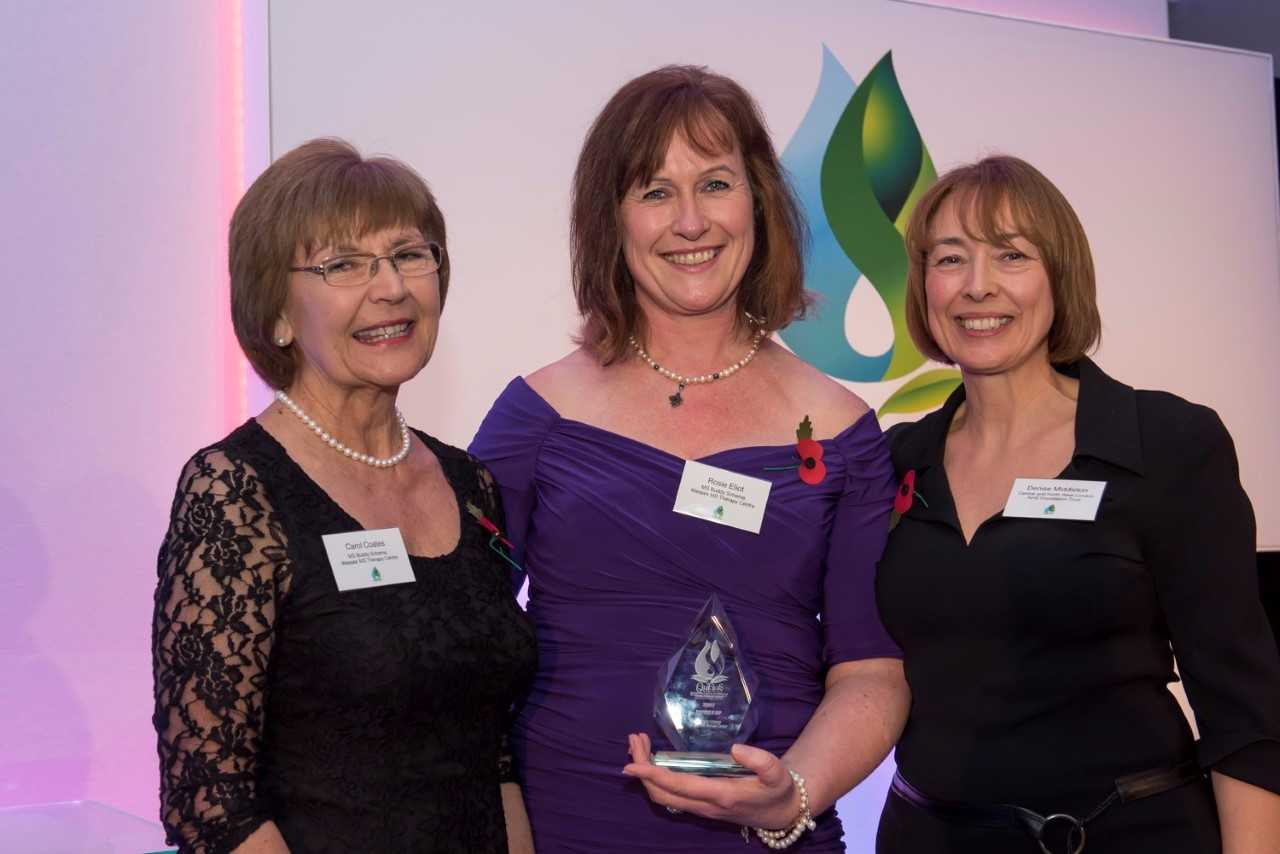
(From left to right: Carol Coates and Rosie Eliot, Wessex MS Therapy Centre and Denise Middleton, Cental North West London NHS Foundation Trust)
“We want to say a big thank you to the MS Trust for recognising the MS Buddy Scheme and we are delighted to have won the Innovation in care category. We are very proud of all the hard work the staff at the therapy centre put in on a daily basis to help people with MS live a better quality of life.”
Rosie Eliot, Centre Director, Wessex MS Therapy Centre
MS Buddy Scheme provides lifeline to patients
This year’s QuDoS recognition programme, organised by pharmaphorum and the Multiple Sclerosis Trust, recognised the best in care for the disease. In the first of a series of articles profiling the winners, pharmaphorum speaks to Wessex MS Therapy Centre, winner of the Innovation in Care category with its MS Buddy Scheme.
Q: Can you describe the scheme and how it works?
A: The MS Buddy Scheme involves volunteers who go out into the homes of people with MS, so that they can have companions with them. It’s especially beneficial for people with relapsing and remitting MS when they can’t come into centres to have their therapies or to meet their friends.
The “buddies” visit MS patients in their homes and offer all kinds of support, such as tidying up around the home, filling in forms, taking them shopping or going for a walk.
Q: What sort of problems do patients experience and how does the scheme benefit them?
Relapses of the disease can be very difficult for patients to handle – symptoms such as fatigue, dizziness, balance and coordination can suddenly get worse.
During relapses, people with the disease may often find they are unable to perform the household tasks they would normally undertake.
Memory and concentration may also be affected, so the buddies are there to help patients when they are at home recovering from a relapse and feeling tired and vulnerable.
Family and friends may step in to help during the recovery period when symptoms are abating, perhaps helping with shopping, washing up, or collecting children from school.
But not everyone has this kind of support network available, which is why the MS Buddy Scheme is so important.
Q: Who came up with the concept and what were the initial steps in terms of implementation?
The scheme was devised by Rosie Eliot and Carol Coates, the charity director and the volunteer coordinator. To build the scheme, Carol created a training schedule together with policies and procedures and attended many meetings with other companion support groups such as Age UK and the local hospice.
Carol has set out the parameters of what is and isn’t acceptable for the buddy and is constantly finding new ways that buddies can work and help those affected with the smallest task.
She also identified which members of the centre wanted a companion, and worked with those that she felt would benefit from a buddy, encouraging them to participate in the scheme.
Once the MS Buddy Scheme was up and running, Carol worked closely with the volunteers to make sure that they were offering the right needs for everyone, meticulously tailoring each pairing to find the right match.
Though the service offers no personal care, Carol has made sure that volunteers are insured so they can take their buddies out in their own cars on public transport, or just for a walk.
The buddy is there to offer whatever the person wants from them, even if it is just to have a chat, watch a favourite film, or to help with form filling.
Q: Can you describe the other team members?
The team also consists of suitable volunteers who have offered their time for free and enjoy visiting people in their own homes. This is an ever-expanding team, one which is highly valued in the charity and we are always looking to recruit further MS Buddies.
Q: How have the MS patients responded to the service?
A: It’s completely astonishing when you see people benefit from something as simple as a shopping trip, or just somebody popping in to have a cup of coffee and a biscuit – it just makes all the difference in the world.
For instance, one member was particularly concerned about the amount of clothes she had stuffed in her wardrobe.
Because she lives on her own and is confined to a wheelchair she found it impossible to clear it out.
Her buddy spent a few hours going through the clothes, so the MS patient could identify which ones she wanted to go to charity and those she wanted to keep.
We have a lady who lives in Salisbury, about 40 minutes away from the centre in Warminster. We have recruited a volunteer who drives to her house and brings her into the centre and this volunteer acts as her buddy. Previously it cost her more than £100 in a special taxi.
One of our members was suffering from depression and her buddy has proved to be of invaluable support, helping with all sorts of life issues that she found insurmountable on her own.
Carol identified that the patient lives alone and has no close family or friends and seemed particularly unhappy over a period of time.
Q: What are the key learnings you’ve taken from this scheme?
The key learnings from the scheme show what a vital role a support worker makes to individuals who might not realise they would benefit from this kind of help. It is extremely difficult for those suffering from social isolation to make friends or invite people into their homes, but the MS Buddy Scheme ensures a comfortable companionship is formed. Many people with MS suffering from depression lack the confidence to participate in the outside world, but with the trust and help of a volunteer MS Buddy this can be overcome.
Q: What did winning mean to you?
We were surprised and delighted to be announced as winners and felt extremely proud that our charity was recognised amongst such illustrious people working in the healthcare sector. The ceremony drew people together with knowledge and expertise in the MS community and we are very proud to have contributed to the long-term care of people with MS.
Q: Do you think this scheme could benefit the wider MS community?
Because we are a charity, everything we do, we do independently. What we would really like to see is for other therapy centres and MS departments to perhaps follow this format. We would be very happy to share our training schedules, policies and procedures so that the MS community can benefit from this simple idea.
For further information on the MS Buddy Scheme, please contact Rosie Eliot, Centre Director: rosie.eliot@wessexms.co.uk

MS Buddy Scheme – two volunteers with a Buddy